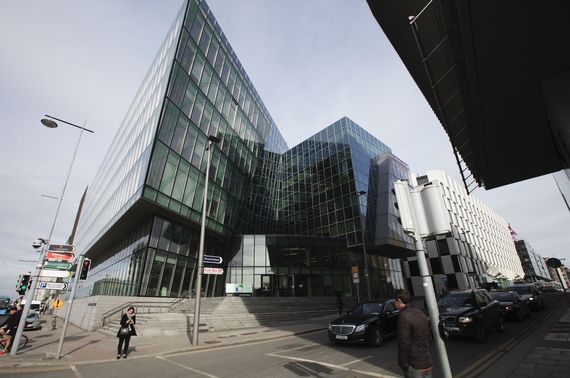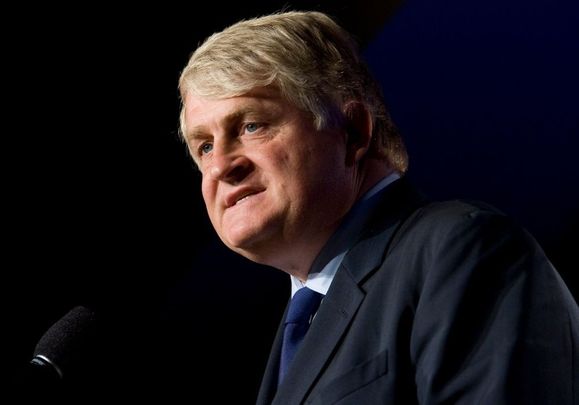Democracy is under threat from Facebook and Ireland is complicit in allowing Facebook’s deeply damaging behavior charged Denis O’Brien, Digicel CEO and founder and Ireland’s leading businessman. He was addressing an audience at Cambridge University on Thursday night.
Denis O’Brien accused Facebook of using Ireland and its lax regulations and said that “Ireland, regrettably, has allowed itself to become Facebook’s laundrette for the biggest tax avoidance scheme in the world.”
Facebook has its European HQ in Dublin and Ireland's Data Protection Commissioner is Facebook's lead regulator in the European Union.
O’Brien, a major philanthropist, whose personal worth has been estimated at $3 billion, made the remarks as guest speaker at the annual Brian Lenihan Junior lecture named in honor of Ireland’s former Finance Minister, a Cambridge graduate, who passed away from cancer in 2011.

Facebook's European HQ in Dublin's Silicon Docks.
O’Brien stated “Make no mistake about it, Facebook is allowing its platform to facilitate anarchy. The revelations by Cambridge Analytica and how Facebook allowed them to use the private data of millions of people to influence elections is incredibly sinister.
“Facebook continues its role in the propagation of hatred, racism, and misinformation without any check.
“Facebook is as insidious as it is pernicious. It is time for the Irish Government, the EU, and the United States to take action.
Too big
“In recent times there have been a number of books that have shone a revealing light on Facebook’s covert practices. Three weeks ago Frances Haugen, a former senior executive with Facebook and a whistle-blower, appeared before a US Congressional Committee and gave insights to Facebook that had never been heard before. What we are now witnessing has all the hallmarks of the opening of a Pandora’s Box. And once the lid lifts…it will never be replaced.
“The current Facebook saga reminds me of what Germany experienced with creeping authoritarianism which few people called out but so bluntly described in the book 'In the Garden of the Beasts'.
“Facebook has become nearly too big to challenge. No single Government can expect to rein them in on their own. The EU has called them out for their business practices but have only achieved modest changes to Facebook's use of private users data. It will need a coalition of like-minded governments to regulate Facebook. The US needs to lead the way and repeal Section 230 of the US Communications Decency Act. This would make Facebook responsible for content.
“EU Competition Law needs to be used to conduct market reviews and enforce conditions on dominant undertakings. Facebook users should all be forced to register and no longer hide behind the cloak of anonymity.
“From a purely business and financial point of view, Ireland is a pivotal partner of Facebook because of its tax laws and, regrettably, is complicit with the egregious practices Facebook operates under...
"Facebook user and generates billions in advertising revenue across 54 countries. It creates no employment and pays no sales tax, no VAT, and no corporation tax. It is the most unbelievable and amoral business model one could ever imagine.
“Furthermore, they don’t invest in the roll-out of broadband in Africa where only 23 percent of people have access to the internet...
Philanthrocapitalism
“Rather than go the Facebook route with poor countries, O'Brien called for better business practices, what he termed “Philanthrocapitalism,” involving a market-based, capitalist for-profit approach to solving the world’s most important issues and helping countries in need.
“He instanced ‘The Giving Pledge,’ a commitment founded by Bill and Melinda Gates for wealthy individuals to donate a portion of their wealth to a range of causes from improving global health to combating poverty as an example.
“It has been supported by Chuck Feeney, an Irish-American philanthropist who has made over $5.5 billion in grants through his organization, The Atlantic Philanthropies."
O’Brien said, “I believe philanthrocapitalism has the potential to be very powerful because it :
• drives problem-solving as opposed to throwing money at a project
• adopts a ‘profit’ motive so that money can be reinvested –
• potentially is a source for very substantial funds
• can address the macro issues that are inhibiting developing countries such as poverty, disasters.
“O’ Brien urged people to learn from the past. “History is such a very important subject because it gives everyone – children and adults - a context to the world in which we live and an insight into how events molded thinking… attitudes… actions… AND prejudice.
Irish influence and experience
Referring to reparations for slavery which he supports, O’Brien instanced the courage of Daniel O’Connell, a giant of Irish politics in the early 19th century, who strongly opposed slavery.
“Imagine how popular he was in the Deep South when he said:
'Slavery is a crime, a high crime against Heaven…..and its annihilation ought not to be postponed.'
“O’Connell’s message that all lives matter inspired famous black abolitionists such as Frederick Douglas on his own political developments in America. Coincidentally, Douglas was General Counsel to Haiti – the first black republic in the world.
“Back in Ireland O’Connell became known as “The Liberator” because he mobilized the predominantly Catholic population – living in abject poverty as tenant farmers – and secured what was known as Catholic Emancipation. This involved the lifting of restrictions on Roman Catholics, including the owning of land, the right to inherit land, and also gave voting rights to Catholics.
Referring to the more recent past, O’Brien stated “In 1921, Ireland won its independence and the Irish Free State came into effect. When that happened Ireland really went out swinging into the world... Instead of working through missionaries and individuals we now acted as an independent sovereign state….with even greater influence.
“Our relations with Africa have long formed a core strand of Ireland’s foreign policy. Last year marked the sixtieth anniversary of Ireland’s diplomatic presence on the continent, with the opening of a Consulate in Nigeria in 1960, followed a year later by a full Embassy.
"The year 1960 also marked the first deployment of Irish Defence Forces as UN Peacekeepers in Africa, with Irish troops serving in the Congo in the following years."
Over the years, Irish peacekeepers have served with distinction across the continent, including in Namibia, Somalia, Liberia and Chad.
“Although we are a small nation, we sit at the highest table and we speak with a clear voice.
“Our experience of getting from under the heels of colonialism helped us take this seat …and it shows how small nations can play important roles because of their affinity with the oppressed.
“In 2015, Ireland played a central role in the development of the Sustainable Development Goals. It was a landmark year in international cooperation towards a sustainable world.
“We are immensely proud of the enormous contribution that Ireland’s development cooperation program has made to the sustainable development of Africa, Asia, South America and the Caribbean over the last 50 years.
“In 2019, Ireland was among the top 20 donors to UN-coordinated humanitarian responses...
ODI, the independent global think tank that works to inspire people to act on injustice and inequality, found Ireland “to be the most principled aid donor” since their rankings began.
“Today, our commitment to these regions is stronger than it has ever been.
“Although I work in the business world and I meet lots of business people, many of whom are boring, I have infinitely greater admiration for people who rattle cages and trust me, Ireland has plenty of them.
“In particular, I think of Bono, famous for his life Album ‘Rattle and Hum’ and also the people behind the Jubilee 2000 debt forgiveness campaign. Bono isn’t just content to be part of one of the most famous rock bands in the world. He is an activist on all fronts, including the Red Campaign which he co-founded with Bobby Shriver to help eliminate HIV-AIDS in 8 African countries.
“He was one of the prime movers in The Jubilee 2000 Debt Forgiveness Coalition. Ultimately they succeeded against all odds in the canceling of $100 billion of debt owed by 35 of the poorest countries in the world. “
Slavery and reparations
Speaking of slavery and the need for reparations O’Brien said:
“I want to change tack here and talk about slavery and colonialism. This is not an Irish man having a rant about Great Britain but I believe very strongly that there is unfinished business in the former colonial world that needs to be addressed….. in particular by the United Kingdom, France, Belgium, Holland, Spain and Portugal. Ingrained in all former colonial countries is a silent but deep-rooted resentment toward their former colonists. Many of them depend on trade and tourism from their former rulers.
“Individually they know they cannot campaign for reparations but together they can. In 2013 CARICOM, which represents the Heads of Government in the Caribbean, adopted a unanimous and historic plan to launch a reparations program against the governments of several European states on behalf of 15 million indigenous people of the Caribbean and for crimes against humanity committed against black or African people of the Caribbean.
“In the case of the UK, in 1834 a payment of £47 million was paid out in two tranches……£20m in a cash payment to the former slave masters and……£27m in free labor to be provided by the newly freed slaves. They were obliged to give their labor for an ‘apprenticeship’ period of 6 years.
“This payment of £47m was the equivalent of a staggering £178 billion in today’s money. Indeed the sum was so large – some 40% of the annual budget of the British Government – that the said British Government borrowed and issued bonds to pay off the ‘compensation’ that they extended to the slave masters.
“The last remaining payments on these bonds were made by the British Government on those slave owners’ compensations bonds in 2015, a mere six years ago.
“Anybody arguing today against reparations can’t say that we’re going back into ancient history. It’s worth noting that the £178 billion, payable to the slave owners, was for just one single generation of enslaved Africans. It had nothing to do with the multiple generations of enslaved Africans who were worked to death on the plantations of the Caribbean for 225 years. Neither the freed slaves nor their ancestors received a penny in compensation.
“I believe Ireland can be an honest broker in bringing together the former colonists and these new independent states that suffered the sheer inhumanity of slavery. Many of the architects of the Good Friday agreement could act as honest brokers, he suggested.”




Comments